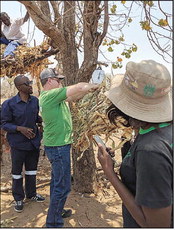The gift of knowledge


Greenwood couple shares farm wisdom with Zimbabwean villagers
Matt and Maria Bendixen do not usually have someone perform a thank you so...


Greenwood couple shares farm wisdom with Zimbabwean villagers
Matt and Maria Bendixen do not usually have someone perform a thank you so...